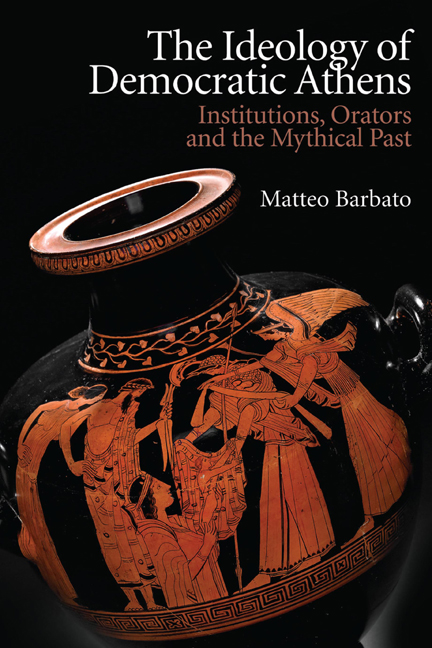Book contents
- Frontmatter
- Contents
- List of Tables and Illustrations
- Preface
- Abbreviations
- 1 Introduction
- 2 Myth and Athenian Democracy
- 3 The Discursive Parameters of Athenian Democratic Institutions
- 4 Exclusiveness and Eugeneia in the Myth of Autochthony
- 5 Between Charis and Philanthrōpia: The Heraclidae
- 6 Fading Shades of Hybris: The Attic Amazonomachy
- 7 Combining Hybris and Philanthrōpia: The Myth of Adrastus
- 8 Conclusions
- Bibliography
- Index Locorum
- General Index
6 - Fading Shades of Hybris: The Attic Amazonomachy
Published online by Cambridge University Press: 17 October 2020
- Frontmatter
- Contents
- List of Tables and Illustrations
- Preface
- Abbreviations
- 1 Introduction
- 2 Myth and Athenian Democracy
- 3 The Discursive Parameters of Athenian Democratic Institutions
- 4 Exclusiveness and Eugeneia in the Myth of Autochthony
- 5 Between Charis and Philanthrōpia: The Heraclidae
- 6 Fading Shades of Hybris: The Attic Amazonomachy
- 7 Combining Hybris and Philanthrōpia: The Myth of Adrastus
- 8 Conclusions
- Bibliography
- Index Locorum
- General Index
Summary
The Amazons have always fascinated both the ancient and the modern imagination. Greek myths about Amazons, with particular attention for their gender implications, have been investigated by several generations of scholars. Archaeological and osteological findings in the Eurasian steppes have revealed that women in those areas commonly practised horse-riding and warfare. Contact with this very different civilisation probably prompted the Greeks to elaborate stories about a nation of Amazon warriors. In Athens, in particular, the Amazon myth held a significant place in the remote and idealised history of the city, which credited the Athenians with the successful repulsion of an Amazon invasion. Yet, stories about the Amazons were not the exclusive domain of the Athenians, but were popular and widespread in Greek mythology more widely.
The Amazons made their earliest literary appearance in Homeric and cyclic epics. In the Iliad, Priam recalls his military encounter with the Amazons on the river Sangarius (Hom. Il. 3.182–90), and Glaucus mentions Bellerophon’s victory against the Amazons in Lycia (Hom. Il. 6.171–86). The epithet ἀντιάνϵιραι – whether it is to be interpreted as ‘opposite to men’ or ‘equal to men’ – qualifies the Amazons in both passages and implicitly emphasises their atypical gender status compared to Greek standards. The Amazons played a significant part in the cyclic Aethiopis, where they joined the Trojan War as allies of the Trojans. In the poem, Achilles slayed Penthesilea, queen of the Amazons, and then killed the Greek Thersites, who had accused him of being in love with the woman (Procl. Chr. 175–81; schol. T ad Hom. Il. 24.804). The poetic tradition also attributed Amazonomachies to Heracles and Theseus. Heracles went to the Amazons’ capital Themiscyra to fetch the girdle of their queen, Hippolyta (Pind. fr. 172 Maehler; Eur. HF 408–18; Ion 1144–45; cf. Apollodoros 2.5.9; Diodoros 4.16). The motif appears on Attic vase painting starting from c. 575 bc. Theseus was also given an expedition to Themiscyra, probably for him to compete with Heracles’ Amazonomachy.
- Type
- Chapter
- Information
- The Ideology of Democratic AthensInstitutions, Orators and the Mythical Past, pp. 144 - 181Publisher: Edinburgh University PressPrint publication year: 2020

